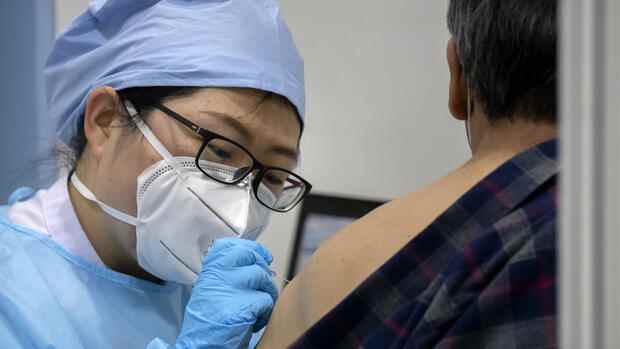In the Chinese capital, proof of vaccination must be presented from Monday to gain access to gyms, cinemas or cultural institutions.
(Photo: AP)
Beijing Business representatives in China fear that the Beijing city government’s U-turn on vaccination records will delay the exit from the zero-Covid policy. Less than two days after the surprising announcement that only vaccinated people are allowed in leisure facilities, the regulation was canceled again.
The European Chamber of Commerce in China was disappointed with the backtrack. Chamber President Jörg Wuttke said he was “very concerned” that the sudden U-turn could prevent other cities in China from launching an effective vaccination campaign. This will also “undermine the possibility of an exit from the zero-Covid policy, at least in the short term”. According to Wuttke, China’s economy will continue to suffer as a result.
The Chinese government is pursuing a strict zero-case strategy. This means that even in the case of individual corona cases, entire blocks of houses or even residential areas are hermetically sealed off. The repeated lockdowns have severely damaged the Chinese economy. Several Chinese cities such as Shanghai and Xi’an are currently struggling with new outbreaks.
Experts see a higher vaccination rate, especially among older people, as a prerequisite for relaxing the strict zero-Covid policy. According to official information, by mid-June, 83 percent of those over 60 in China had been double-vaccinated, and 65 percent had been triple-vaccinated. However, experts doubt the comparatively high numbers. Just three contacts with the virus, whether through vaccination or infection, are considered sufficient protection against serious illness or even death.
Top jobs of the day
Find the best jobs now and
be notified by email.
The number of vaccinations has recently fallen sharply. Even the International Monetary Fund had warned at the end of June that the slow progress of the vaccination campaign was preventing consumption from recovering. Observers therefore saw Beijing’s advance with mandatory proof of vaccination for frequently visited facilities such as fitness studios, cinemas or museums as well as senior citizens’ homes as an attempt to increase the pressure on the unvaccinated. It would have been the first time that Chinese authorities have requested proof of vaccination.
Proof of vaccination not permitted under national law
But the backtrack came less than two days after the announcement. It is striking that, unlike what is often the case in China, no face-saving solution was chosen for the Beijing city government, for example by simply not checking the new regulation. Rather, the reversal was communicated in the state-run newspaper “Beijing Youth Daily”, with reference to “concerns and doubts among the population” as a result of the announcement.
The article quotes an unnamed “responsible comrade” from the Beijing epidemic control agency that a PCR test that is no more than 72 hours old is still sufficient for access to leisure facilities. Vaccinations are an important measure to fight the pandemic, the official said, but they are voluntary. This emerges from the ninth disease protection plan of the State Council, i.e. the central government.
That means: The Beijing city tour broke national regulations with the introduction of a vaccination certificate. On social media, malice spilled over the amateurish approach of those responsible in Beijing. The criticism initially remained largely uncensored.
Observers therefore also consider the announcement and the counter-reaction to be an indication of political power struggles in the run-up to the important party congress in the fall, at which the leadership of the ruling Chinese Communist Party will be reconstituted. A third term for party leader Xi Jinping is considered assured. But it is still unclear how the highest party body, the Politburo, will be composed in the future. The decision on this should be made in the coming weeks.
More: Stocks crash, slump in growth, lockdown madness: The China crash
